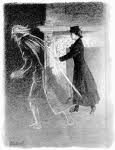[This is taken from Augustine Calmet's Phantom World, originally published in 1850, revised and edited by D. J. McAdam, 2010. Copyright as such.]

Le Loyer, in his book upon specters, maintains that the demon can cause the possessed to make extraordinary and involuntary movements. He can then, if allowed by God, give motion to a dead and insensible man.
He relates the instance of Polycrites, a magistrate of Aetolia, who appeared to the people of Locria nine or ten months after his death, and told them to show him his child, which being born monstrous, they wished to burn with its mother. The Locrians, in spite of the remonstrance of the specter of Polycrites, persisting in their determination, Polycrites took his child, tore it to pieces and devoured it, leaving only the head, while the people could neither send him away nor prevent him; after that, he disappeared. The Aetolians were desirous of sending to consult the Delphian oracle, but the head of the child began to speak, and foretold the misfortunes which were to happen to their country and to his own mother.
After the battle between King Antiochus and the Romans, an officer named Buptages, left dead on the field of battle, with twelve mortal wounds, rose up suddenly, and began to threaten the Romans with the evils which were to happen to them through the foreign nations who were to destroy the Roman empire. He pointed out in particular, that armies would come from Asia, and desolate Europe, which may designate the irruption of the Turks upon the domains of the Roman empire.
After that, Buptages climbed up an oak tree, and foretold that he was about to be devoured by a wolf, which happened. After the wolf had devoured the body, the head again spoke to the Romans, and forbade them to bury him. All that appears very incredible, and was not accomplished in fact. It was not the people of Asia, but those of the north, who overthrew the Roman empire.
In the war of Augustus against Sextus Pompey, son of the great Pompey, a soldier of Augustus, named Gabinius, had his head cut off by order of young Pompey, so that it only held on to the neck by a narrow strip of flesh. Towards evening they heard Gabinius lamenting; they ran to him, and he said that he had returned from hell to reveal very important things to Pompey. Pompey did not think proper to go to him, but he sent one of his men, to whom Gabinius declared that the gods on high had decreed the happy destiny of Pompey, and that he would succeed in all his designs. Directly Gabinius had thus spoken, he fell down dead and stiff. This pretended prediction was falsified by the facts. Pompey was vanquished, and Caesar gained all the advantage in this war.
A certain female juggler had died, but a magician of the band put a charm under her armpits, which gave her power to move; but another wizard having looked at her, cried out that it was only vile carrion, and immediately she fell down dead, and appeared what she was in fact.
Nicole Aubri, a native of Vervius, being possessed by several devils, one of these devils, named Baltazo, took from the gibbet the body of a man who had been hanged near the plain of Arlon, and in this body went to the husband of Nicole Aubri, promising to deliver his wife from her possession if he would let him pass the night with her. The husband consulted the schoolmaster, who practiced exorcising, and who told him on no account to grant what was asked of him. The husband and Baltazo having entered the church, the woman who was possessed called him by his name, and immediately this Baltazo disappeared. The schoolmaster conjuring the possessed, Beelzebub, one of the demons, revealed what Baltazo had done, and that if the husband had granted what he asked, he would have flown away with Nicole Aubri, both body and soul.
Le Loyer again relates four other instances of persons whom the demon had seemed to restore to life, to satisfy the brutal passion of two lovers.
Disclosure: We are independently owned and the opinions expressed here are our own. We do have advertisements with links to other sites on our pages, and may receive compensation when you click on one of those links and/or purchase something from one of those sites.
Copyright © D. J. McAdam· All Rights Reserved